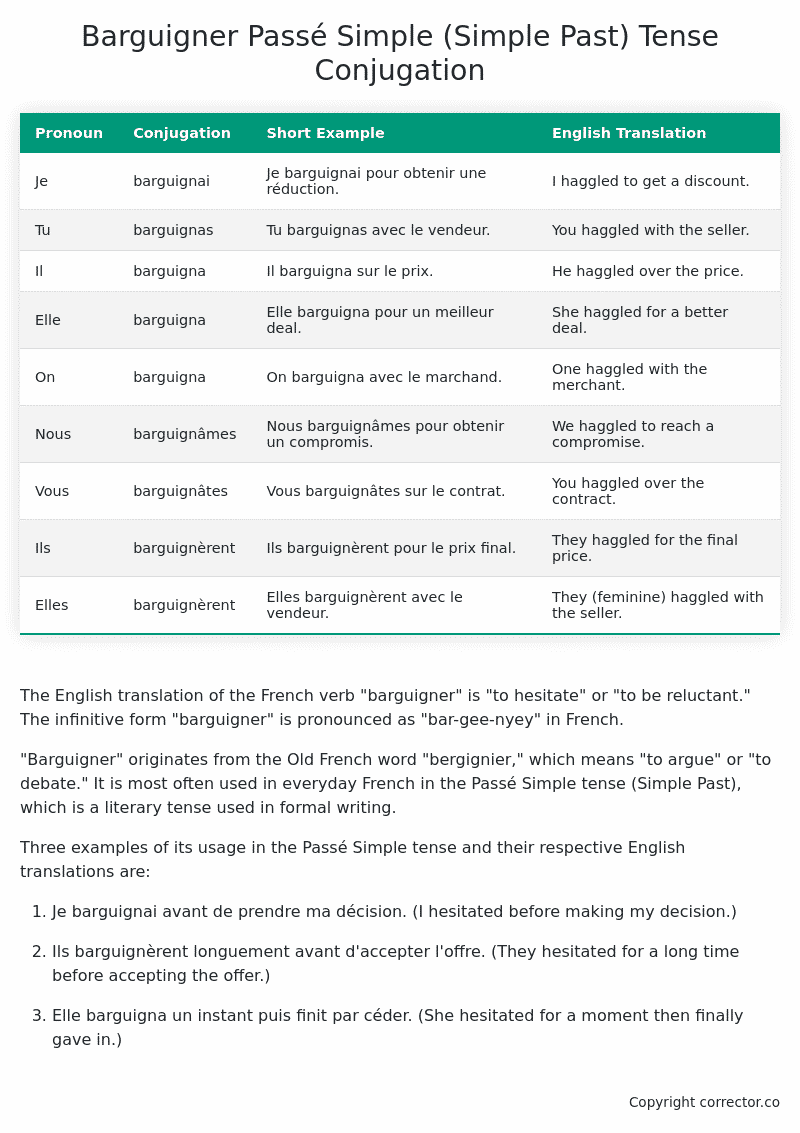Passé Simple (Simple Past) Tense Conjugation of the French Verb barguigner
Introduction to the verb barguigner
The English translation of the French verb “barguigner” is “to hesitate” or “to be reluctant.” The infinitive form “barguigner” is pronounced as “bar-gee-nyey” in French.
“Barguigner” originates from the Old French word “bergignier,” which means “to argue” or “to debate.” It is most often used in everyday French in the Passé Simple tense (Simple Past), which is a literary tense used in formal writing.
Three examples of its usage in the Passé Simple tense and their respective English translations are:
-
Je barguignai avant de prendre ma décision.
(I hesitated before making my decision.) -
Ils barguignèrent longuement avant d’accepter l’offre.
(They hesitated for a long time before accepting the offer.) -
Elle barguigna un instant puis finit par céder.
(She hesitated for a moment then finally gave in.)
Table of the Passé Simple (Simple Past) Tense Conjugation of barguigner
| Pronoun | Conjugation | Short Example | English Translation |
|---|---|---|---|
| Je | barguignai | Je barguignai pour obtenir une réduction. | I haggled to get a discount. |
| Tu | barguignas | Tu barguignas avec le vendeur. | You haggled with the seller. |
| Il | barguigna | Il barguigna sur le prix. | He haggled over the price. |
| Elle | barguigna | Elle barguigna pour un meilleur deal. | She haggled for a better deal. |
| On | barguigna | On barguigna avec le marchand. | One haggled with the merchant. |
| Nous | barguignâmes | Nous barguignâmes pour obtenir un compromis. | We haggled to reach a compromise. |
| Vous | barguignâtes | Vous barguignâtes sur le contrat. | You haggled over the contract. |
| Ils | barguignèrent | Ils barguignèrent pour le prix final. | They haggled for the final price. |
| Elles | barguignèrent | Elles barguignèrent avec le vendeur. | They (feminine) haggled with the seller. |
Other Conjugations for Barguigner.
Le Present (Present Tense) Conjugation of the French Verb barguigner
Imparfait (Imperfect) Tense Conjugation of the French Verb barguigner
Passé Simple (Simple Past) Tense Conjugation of the French Verb barguigner (You’re reading it right now!)
Passé Composé (Present Perfect) Tense Conjugation of the French Verb barguigner
Futur Simple (Simple Future) Tense Conjugation of the French Verb barguigner
Futur Proche (Near Future) Tense Conjugation of the French Verb barguigner
Plus-que-parfait (Pluperfect) Tense Conjugation of the French Verb barguigner
Passé Antérieur (Past Anterior) Tense Conjugation of the French Verb barguigner
Futur Antérieur (Future Anterior) Tense Conjugation of the French Verb barguigner
Subjonctif Présent (Subjunctive Present) Tense Conjugation of the French Verb barguigner
Subjonctif Passé (Subjunctive Past) Tense Conjugation of the French Verb barguigner
Subjonctif Imparfait (Subjunctive Imperfect) Tense Conjugation of the French Verb barguigner
Subjonctif Plus-que-parfait (Subjunctive Pluperfect) Tense Conjugation of the French Verb barguigner
Conditionnel Présent (Conditional Present) Tense Conjugation of the French Verb barguigner
Conditionnel Passé (Conditional Past) Tense Conjugation of the French Verb barguigner
Conditionnel Passé II (Conditional Past II) Tense Conjugation of the French Verb barguigner
L’impératif Présent (Imperative Present) Tense Conjugation of the French Verb barguigner
L’impératif Passé (Imperative Past) Tense Conjugation of the French Verb barguigner
L’infinitif Présent (Infinitive Present) Tense Conjugation of the French Verb barguigner
L’infinitif Passé (Infinitive Past) Tense Conjugation of the French Verb barguigner
Le Participe Présent (Present Participle) Tense Conjugation of the French Verb barguigner
Le Participe Passé (Past Participle) Tense Conjugation of the French Verb barguigner
Struggling with French verbs or the language in general? Why not use our free French Grammar Checker – no registration required!
Get a FREE Download Study Sheet of this Conjugation 🔥
Simply right click the image below, click “save image” and get your free reference for the barguigner Passé Simple tense conjugation!

Barguigner – About the French Passé Simple (Simple Past) Tense
Formation
Usage
Narration
Historical Context
Interactions with other tenses
Passé Composé
Imparfait
Conditional and Subjunctive
Summary
I hope you enjoyed this article on the verb barguigner. Still in a learning mood? Check out another TOTALLY random French verb conjugation!


